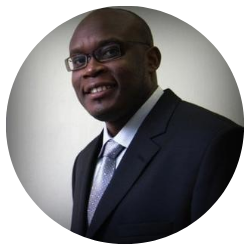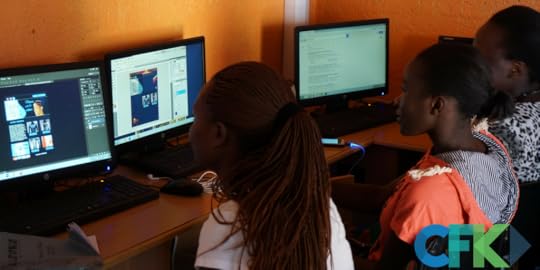Board Highlight: Thinking Beyond Education to Empower Communities
Growing up in Kibera, Dickson Omondi developed an appreciation for development work and an in-depth understanding of the complex challenges facing his community. In his youth, he saw many of his peers experiment with drugs and alcohol, become involved in crime, or become pregnant and drop out of school. Some of his friends, even though academically capable or talented in sports and arts, succumbed to hopelessness and the heavy weight of poverty.

“Back then, only a few from Kibera slums would qualify to go to university, and in a context in which the labor market prioritized educational achievement, many remained trapped in a vicious cycle of poverty, unable to achieve their full potential,” he said. “School made me aware of the have and the have nots, the challenges of social inequalities, and I became interested in learning about how someone can move out of abject poverty and fully realize their potential and secure minimum guarantees of good health, adequate nutrition, housing, and other basic needs.”
Thinking Beyond Education
Though Dickson recognized that access to education is a significant factor in breaking the cycle of poverty, he emphasized that youth in Kibera needed more to build resilience and a strong character as well as nurture their talents in sports and arts. They needed social programs that met their unique needs and kept them engaged while teaching skills that would make them competitive in the job market and encourage them to utilize their talents and abilities
“Most people in Kibera don’t have the time or the resources to think about developing specific skills to make them competitive in the job market,” Dickson said. “They are worried about how they are going to put bread on the table if they don’t have a job or how they are going to keep their families healthy and meet other basic needs. They mostly then end up operating at their lowest potential due to these external factors.”
From Dickson’s perspective, one of the most valuable and innovative CFK programs is its information and computer technology workshops.
“The program teaches our young people how to use computers, which gives them skills that can help them as they enter the job market,” Dickson said, “but it also keeps them engaged, which can prevent them from getting into trouble and help them avoid many other pitfalls.”

The Power of Holistic Programs
Though Dickson has a soft spot for our computer technology programs, he believes that what truly makes CFK’s work effective are its relevant interventions, productive partnerships, and holistic approach. Issues facing the Kibera community, including poverty, poor sanitation, food insecurity, and more, overlap and are multi-layered. It is impossible to separate these issues from each other, which highlights the need for complementary services and holistic programming.
“To have a real impact, you have to think about families and the issues they are dealing with,” Dickson said. “One family may need mentorship for their daughter, a job for their son, and pre–and post-natal care for their pregnant mother. It is a chain, and you can’t have an effective impact on a family by addressing one of their needs while excluding the others.”
CFK’s diverse programs in maternal health, youth mentorship, and skill development among others reflect a holistic approach to the myriad of challenges facing families in Kibera. As Dickson noted, “The Tabitha clinic complements government health services and is now expanding its maternal health infrastructure, and it is not far from a computer laboratory that is equipping young people with critical job skills.”
Though development work can present skewed relationships and power imbalances between beneficiaries and staff, our long-standing presence in the community and partnerships with local actors help us develop relevant and responsible interventions in Kibera.
“I appreciate that CFK programs are grounded in community needs and include input from the community itself,” Dickson said. “No matter what level of leadership you talk to at CFK, they are genuine and invested in each project, and they work hard to ensure that it benefits the local community.”
As a member of our Board of Directors, Dickson connects CFK to local resources and provides advice on program strategy and development, but he believes that his greatest impact is providing moral support and mentorship for our Executive Director, Hillary Omala.
“The work that Hillary leads is important but tiring, so I like to check–in, encourage him, share ideas and help him in any way possible,” Dickson said. “I am here to help him move to the next day and get through the next challenge so that CFK can continue to have a positive impact in Kibera.”
Thinking Globally, Acting Locally
As CFK prepares to celebrate 20 years of service in 2021, we are reflecting on organizational successes, identifying opportunities for improvement, and thinking about how we can expand and model our impact to other informal settlements in Kenya and around the world.
“Many of the challenges facing informal settlements are the same even beyond Kenya, so figuring out how to tailor CFK’s model for other areas would be a great contribution,” Dickson said. “I also believe we have an opportunity to invest even more in programs for young people so they can fully realize their capabilities whether in academics, sports, or the arts. This bridges the inequality divide, but more importantly, it empowers them to pursue their aspirations and career goals.”
Though Dickson currently works for an international development organization, he finds himself continuously drawn to give back to the community he was born and grew up in.
“I feel I have a home to go back to and give back to as I get older and have more time. While I can’t volunteer in the same ways I used to when I was young, CFK provides me with an opportunity to be involved at another level, and I am excited to be a part of it,” he said.
Learn more about how we are supporting young people through entrepreneurship and economic development.
Stories of Progress
 Board Highlight: Thinking Beyond Education to Empower Communitiesby Hannah Bain
Board Highlight: Thinking Beyond Education to Empower Communitiesby Hannah Bain
 CFK Healthcare Staff Featured as Frontline Heroesby Hannah Bain
CFK Healthcare Staff Featured as Frontline Heroesby Hannah Bain
 COVID-19 Response: Healthcare Facilitiesby Hannah Bain
COVID-19 Response: Healthcare Facilitiesby Hannah BainThe post Board Highlight: Thinking Beyond Education to Empower Communities appeared first on Carolina for Kibera.
Rye Barcott's Blog
- Rye Barcott's profile
- 7 followers



